Hospitality Consumer Behavior and the Decision-Making Process Analysis
VerifiedAdded on 2023/06/17
|14
|4299
|498
Report
AI Summary
This report provides an in-depth analysis of consumer behavior within the hospitality industry, specifically focusing on Premier Inn. It investigates the social, personal, cultural, and psychological factors that influence consumer attitudes and behaviors when selecting hotels and restaurants. The report explores the impact of digital technology on consumer trends, including smart hotels, robots, and mobile check-in services. It examines the stages of the consumer decision-making journey, from need recognition to post-purchase behavior, and emphasizes the importance of mapping this journey for marketers. Furthermore, the report evaluates various market research approaches used to understand consumer decision-making, and it assesses how marketers respond to and influence different stages of this process, providing relevant examples from the hospitality sector. The report concludes by critically evaluating the effectiveness of marketing strategies in shaping consumer choices in the hospitality industry.
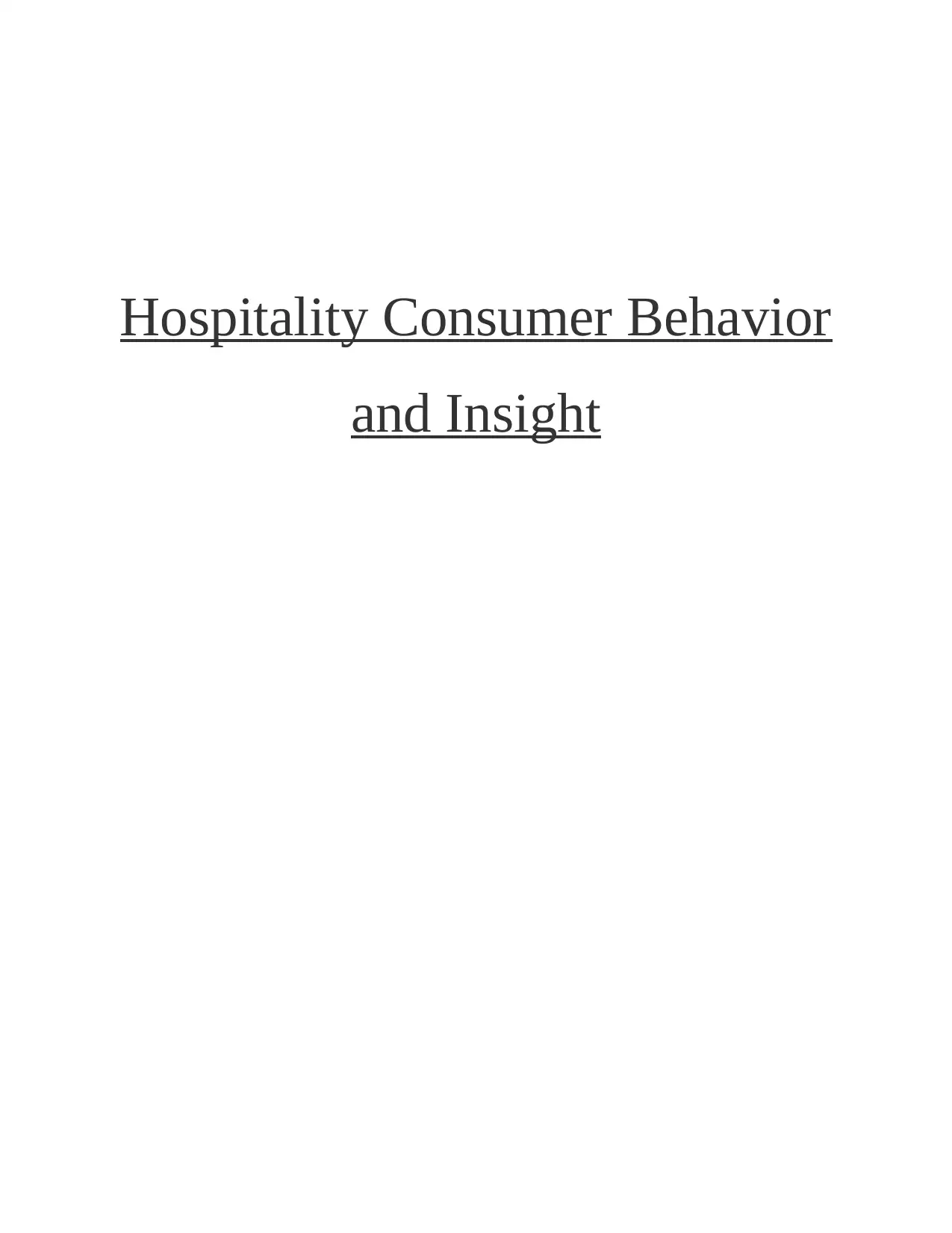
Hospitality Consumer Behavior
and Insight
and Insight
Paraphrase This Document
Need a fresh take? Get an instant paraphrase of this document with our AI Paraphraser
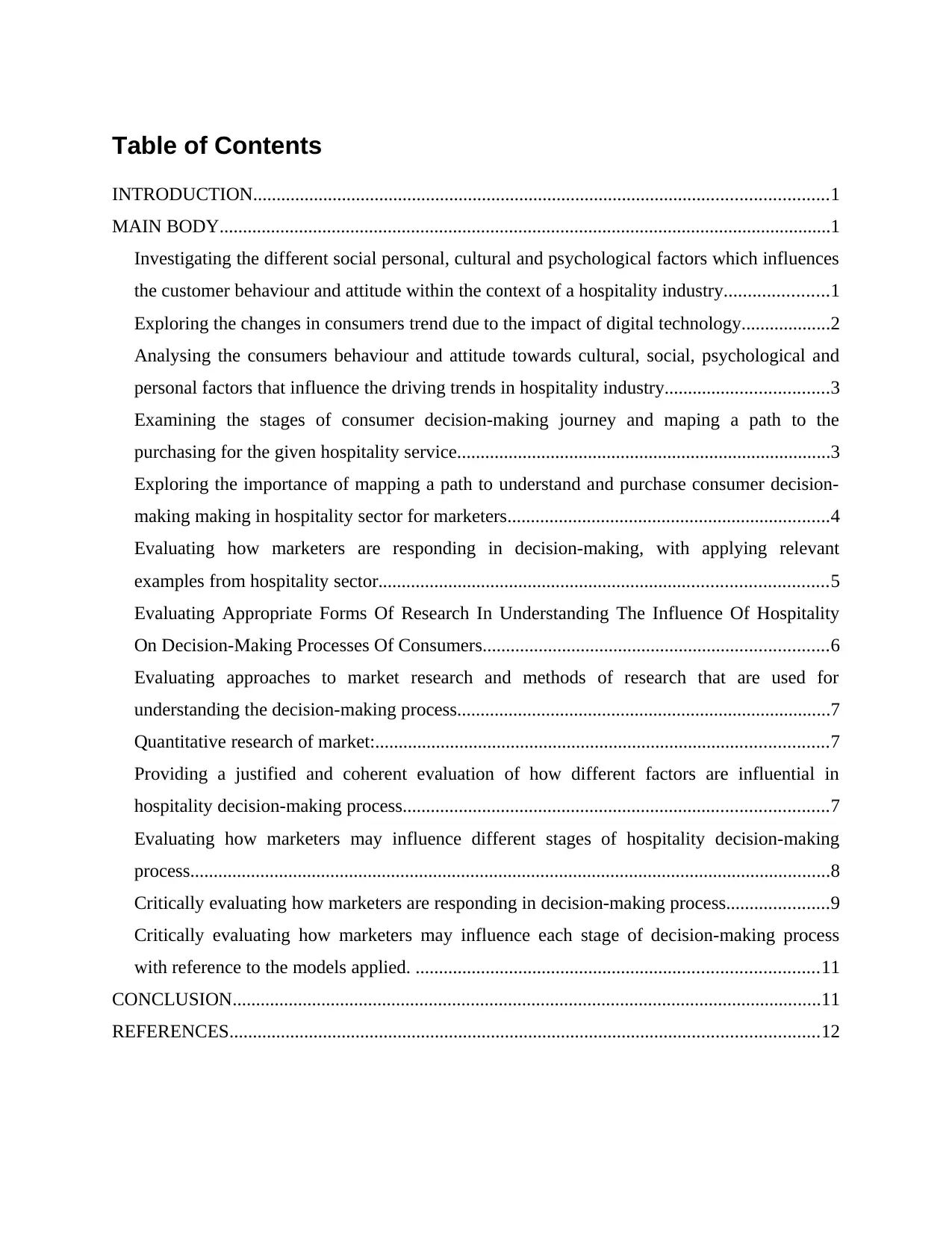
Table of Contents
INTRODUCTION...........................................................................................................................1
MAIN BODY...................................................................................................................................1
Investigating the different social personal, cultural and psychological factors which influences
the customer behaviour and attitude within the context of a hospitality industry......................1
Exploring the changes in consumers trend due to the impact of digital technology...................2
Analysing the consumers behaviour and attitude towards cultural, social, psychological and
personal factors that influence the driving trends in hospitality industry...................................3
Examining the stages of consumer decision-making journey and maping a path to the
purchasing for the given hospitality service................................................................................3
Exploring the importance of mapping a path to understand and purchase consumer decision-
making making in hospitality sector for marketers.....................................................................4
Evaluating how marketers are responding in decision-making, with applying relevant
examples from hospitality sector................................................................................................5
Evaluating Appropriate Forms Of Research In Understanding The Influence Of Hospitality
On Decision-Making Processes Of Consumers..........................................................................6
Evaluating approaches to market research and methods of research that are used for
understanding the decision-making process................................................................................7
Quantitative research of market:.................................................................................................7
Providing a justified and coherent evaluation of how different factors are influential in
hospitality decision-making process...........................................................................................7
Evaluating how marketers may influence different stages of hospitality decision-making
process.........................................................................................................................................8
Critically evaluating how marketers are responding in decision-making process......................9
Critically evaluating how marketers may influence each stage of decision-making process
with reference to the models applied. ......................................................................................11
CONCLUSION..............................................................................................................................11
REFERENCES..............................................................................................................................12
INTRODUCTION...........................................................................................................................1
MAIN BODY...................................................................................................................................1
Investigating the different social personal, cultural and psychological factors which influences
the customer behaviour and attitude within the context of a hospitality industry......................1
Exploring the changes in consumers trend due to the impact of digital technology...................2
Analysing the consumers behaviour and attitude towards cultural, social, psychological and
personal factors that influence the driving trends in hospitality industry...................................3
Examining the stages of consumer decision-making journey and maping a path to the
purchasing for the given hospitality service................................................................................3
Exploring the importance of mapping a path to understand and purchase consumer decision-
making making in hospitality sector for marketers.....................................................................4
Evaluating how marketers are responding in decision-making, with applying relevant
examples from hospitality sector................................................................................................5
Evaluating Appropriate Forms Of Research In Understanding The Influence Of Hospitality
On Decision-Making Processes Of Consumers..........................................................................6
Evaluating approaches to market research and methods of research that are used for
understanding the decision-making process................................................................................7
Quantitative research of market:.................................................................................................7
Providing a justified and coherent evaluation of how different factors are influential in
hospitality decision-making process...........................................................................................7
Evaluating how marketers may influence different stages of hospitality decision-making
process.........................................................................................................................................8
Critically evaluating how marketers are responding in decision-making process......................9
Critically evaluating how marketers may influence each stage of decision-making process
with reference to the models applied. ......................................................................................11
CONCLUSION..............................................................................................................................11
REFERENCES..............................................................................................................................12
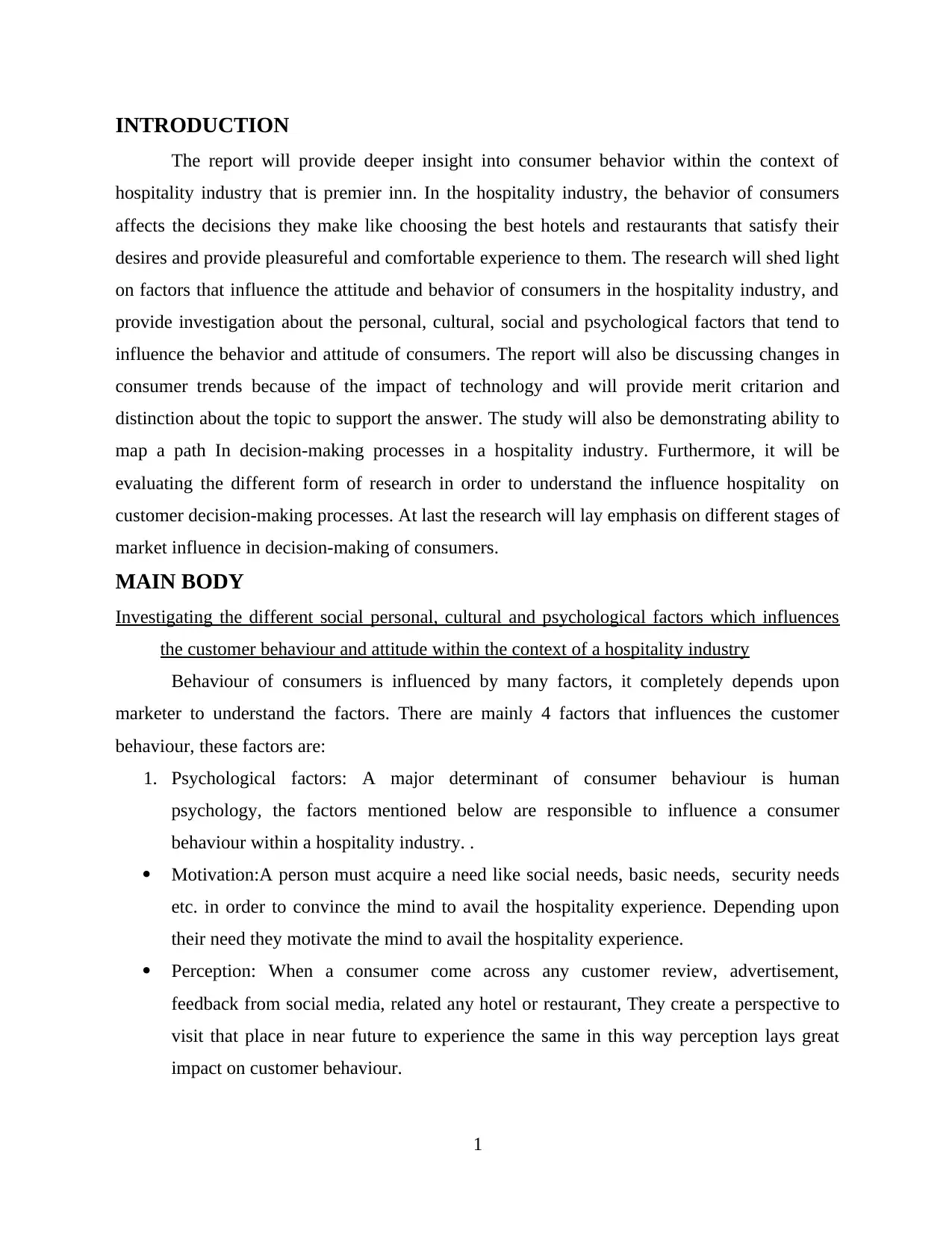
INTRODUCTION
The report will provide deeper insight into consumer behavior within the context of
hospitality industry that is premier inn. In the hospitality industry, the behavior of consumers
affects the decisions they make like choosing the best hotels and restaurants that satisfy their
desires and provide pleasureful and comfortable experience to them. The research will shed light
on factors that influence the attitude and behavior of consumers in the hospitality industry, and
provide investigation about the personal, cultural, social and psychological factors that tend to
influence the behavior and attitude of consumers. The report will also be discussing changes in
consumer trends because of the impact of technology and will provide merit critarion and
distinction about the topic to support the answer. The study will also be demonstrating ability to
map a path In decision-making processes in a hospitality industry. Furthermore, it will be
evaluating the different form of research in order to understand the influence hospitality on
customer decision-making processes. At last the research will lay emphasis on different stages of
market influence in decision-making of consumers.
MAIN BODY
Investigating the different social personal, cultural and psychological factors which influences
the customer behaviour and attitude within the context of a hospitality industry
Behaviour of consumers is influenced by many factors, it completely depends upon
marketer to understand the factors. There are mainly 4 factors that influences the customer
behaviour, these factors are:
1. Psychological factors: A major determinant of consumer behaviour is human
psychology, the factors mentioned below are responsible to influence a consumer
behaviour within a hospitality industry. .
Motivation:A person must acquire a need like social needs, basic needs, security needs
etc. in order to convince the mind to avail the hospitality experience. Depending upon
their need they motivate the mind to avail the hospitality experience.
Perception: When a consumer come across any customer review, advertisement,
feedback from social media, related any hotel or restaurant, They create a perspective to
visit that place in near future to experience the same in this way perception lays great
impact on customer behaviour.
1
The report will provide deeper insight into consumer behavior within the context of
hospitality industry that is premier inn. In the hospitality industry, the behavior of consumers
affects the decisions they make like choosing the best hotels and restaurants that satisfy their
desires and provide pleasureful and comfortable experience to them. The research will shed light
on factors that influence the attitude and behavior of consumers in the hospitality industry, and
provide investigation about the personal, cultural, social and psychological factors that tend to
influence the behavior and attitude of consumers. The report will also be discussing changes in
consumer trends because of the impact of technology and will provide merit critarion and
distinction about the topic to support the answer. The study will also be demonstrating ability to
map a path In decision-making processes in a hospitality industry. Furthermore, it will be
evaluating the different form of research in order to understand the influence hospitality on
customer decision-making processes. At last the research will lay emphasis on different stages of
market influence in decision-making of consumers.
MAIN BODY
Investigating the different social personal, cultural and psychological factors which influences
the customer behaviour and attitude within the context of a hospitality industry
Behaviour of consumers is influenced by many factors, it completely depends upon
marketer to understand the factors. There are mainly 4 factors that influences the customer
behaviour, these factors are:
1. Psychological factors: A major determinant of consumer behaviour is human
psychology, the factors mentioned below are responsible to influence a consumer
behaviour within a hospitality industry. .
Motivation:A person must acquire a need like social needs, basic needs, security needs
etc. in order to convince the mind to avail the hospitality experience. Depending upon
their need they motivate the mind to avail the hospitality experience.
Perception: When a consumer come across any customer review, advertisement,
feedback from social media, related any hotel or restaurant, They create a perspective to
visit that place in near future to experience the same in this way perception lays great
impact on customer behaviour.
1
⊘ This is a preview!⊘
Do you want full access?
Subscribe today to unlock all pages.

Trusted by 1+ million students worldwide
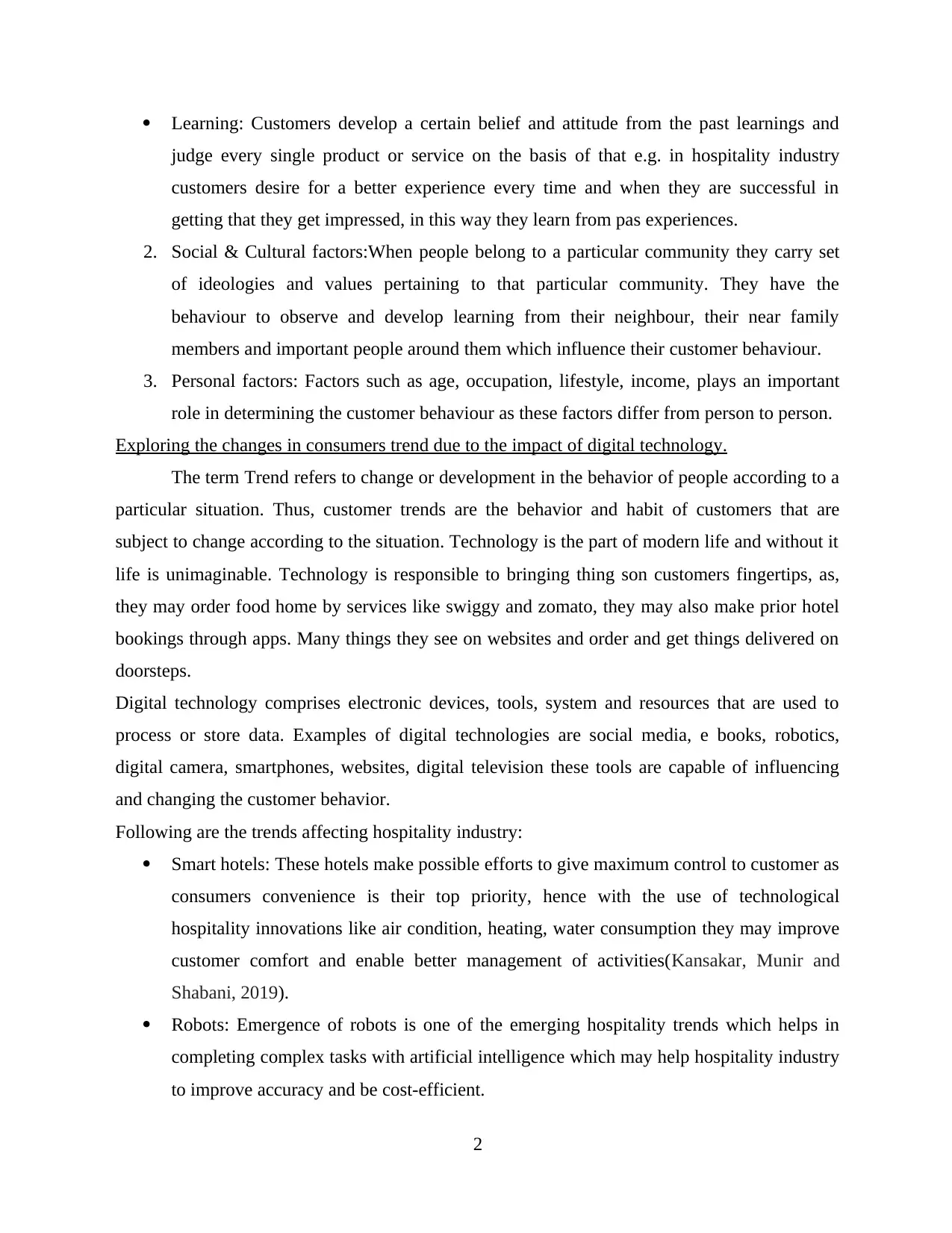
Learning: Customers develop a certain belief and attitude from the past learnings and
judge every single product or service on the basis of that e.g. in hospitality industry
customers desire for a better experience every time and when they are successful in
getting that they get impressed, in this way they learn from pas experiences.
2. Social & Cultural factors:When people belong to a particular community they carry set
of ideologies and values pertaining to that particular community. They have the
behaviour to observe and develop learning from their neighbour, their near family
members and important people around them which influence their customer behaviour.
3. Personal factors: Factors such as age, occupation, lifestyle, income, plays an important
role in determining the customer behaviour as these factors differ from person to person.
Exploring the changes in consumers trend due to the impact of digital technology.
The term Trend refers to change or development in the behavior of people according to a
particular situation. Thus, customer trends are the behavior and habit of customers that are
subject to change according to the situation. Technology is the part of modern life and without it
life is unimaginable. Technology is responsible to bringing thing son customers fingertips, as,
they may order food home by services like swiggy and zomato, they may also make prior hotel
bookings through apps. Many things they see on websites and order and get things delivered on
doorsteps.
Digital technology comprises electronic devices, tools, system and resources that are used to
process or store data. Examples of digital technologies are social media, e books, robotics,
digital camera, smartphones, websites, digital television these tools are capable of influencing
and changing the customer behavior.
Following are the trends affecting hospitality industry:
Smart hotels: These hotels make possible efforts to give maximum control to customer as
consumers convenience is their top priority, hence with the use of technological
hospitality innovations like air condition, heating, water consumption they may improve
customer comfort and enable better management of activities(Kansakar, Munir and
Shabani, 2019).
Robots: Emergence of robots is one of the emerging hospitality trends which helps in
completing complex tasks with artificial intelligence which may help hospitality industry
to improve accuracy and be cost-efficient.
2
judge every single product or service on the basis of that e.g. in hospitality industry
customers desire for a better experience every time and when they are successful in
getting that they get impressed, in this way they learn from pas experiences.
2. Social & Cultural factors:When people belong to a particular community they carry set
of ideologies and values pertaining to that particular community. They have the
behaviour to observe and develop learning from their neighbour, their near family
members and important people around them which influence their customer behaviour.
3. Personal factors: Factors such as age, occupation, lifestyle, income, plays an important
role in determining the customer behaviour as these factors differ from person to person.
Exploring the changes in consumers trend due to the impact of digital technology.
The term Trend refers to change or development in the behavior of people according to a
particular situation. Thus, customer trends are the behavior and habit of customers that are
subject to change according to the situation. Technology is the part of modern life and without it
life is unimaginable. Technology is responsible to bringing thing son customers fingertips, as,
they may order food home by services like swiggy and zomato, they may also make prior hotel
bookings through apps. Many things they see on websites and order and get things delivered on
doorsteps.
Digital technology comprises electronic devices, tools, system and resources that are used to
process or store data. Examples of digital technologies are social media, e books, robotics,
digital camera, smartphones, websites, digital television these tools are capable of influencing
and changing the customer behavior.
Following are the trends affecting hospitality industry:
Smart hotels: These hotels make possible efforts to give maximum control to customer as
consumers convenience is their top priority, hence with the use of technological
hospitality innovations like air condition, heating, water consumption they may improve
customer comfort and enable better management of activities(Kansakar, Munir and
Shabani, 2019).
Robots: Emergence of robots is one of the emerging hospitality trends which helps in
completing complex tasks with artificial intelligence which may help hospitality industry
to improve accuracy and be cost-efficient.
2
Paraphrase This Document
Need a fresh take? Get an instant paraphrase of this document with our AI Paraphraser
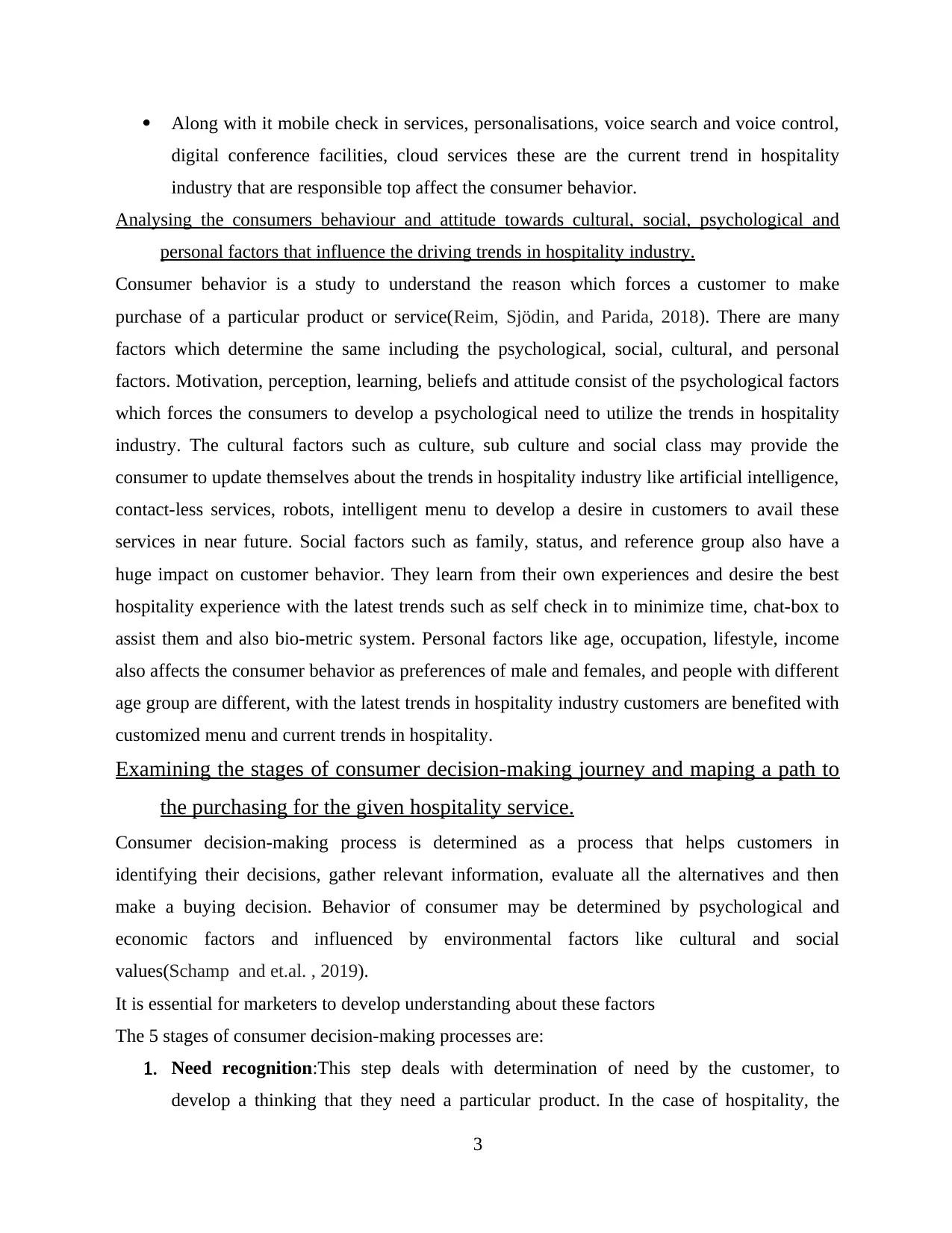
Along with it mobile check in services, personalisations, voice search and voice control,
digital conference facilities, cloud services these are the current trend in hospitality
industry that are responsible top affect the consumer behavior.
Analysing the consumers behaviour and attitude towards cultural, social, psychological and
personal factors that influence the driving trends in hospitality industry.
Consumer behavior is a study to understand the reason which forces a customer to make
purchase of a particular product or service(Reim, Sjödin, and Parida, 2018). There are many
factors which determine the same including the psychological, social, cultural, and personal
factors. Motivation, perception, learning, beliefs and attitude consist of the psychological factors
which forces the consumers to develop a psychological need to utilize the trends in hospitality
industry. The cultural factors such as culture, sub culture and social class may provide the
consumer to update themselves about the trends in hospitality industry like artificial intelligence,
contact-less services, robots, intelligent menu to develop a desire in customers to avail these
services in near future. Social factors such as family, status, and reference group also have a
huge impact on customer behavior. They learn from their own experiences and desire the best
hospitality experience with the latest trends such as self check in to minimize time, chat-box to
assist them and also bio-metric system. Personal factors like age, occupation, lifestyle, income
also affects the consumer behavior as preferences of male and females, and people with different
age group are different, with the latest trends in hospitality industry customers are benefited with
customized menu and current trends in hospitality.
Examining the stages of consumer decision-making journey and maping a path to
the purchasing for the given hospitality service.
Consumer decision-making process is determined as a process that helps customers in
identifying their decisions, gather relevant information, evaluate all the alternatives and then
make a buying decision. Behavior of consumer may be determined by psychological and
economic factors and influenced by environmental factors like cultural and social
values(Schamp and et.al. , 2019).
It is essential for marketers to develop understanding about these factors
The 5 stages of consumer decision-making processes are:
1. Need recognition:This step deals with determination of need by the customer, to
develop a thinking that they need a particular product. In the case of hospitality, the
3
digital conference facilities, cloud services these are the current trend in hospitality
industry that are responsible top affect the consumer behavior.
Analysing the consumers behaviour and attitude towards cultural, social, psychological and
personal factors that influence the driving trends in hospitality industry.
Consumer behavior is a study to understand the reason which forces a customer to make
purchase of a particular product or service(Reim, Sjödin, and Parida, 2018). There are many
factors which determine the same including the psychological, social, cultural, and personal
factors. Motivation, perception, learning, beliefs and attitude consist of the psychological factors
which forces the consumers to develop a psychological need to utilize the trends in hospitality
industry. The cultural factors such as culture, sub culture and social class may provide the
consumer to update themselves about the trends in hospitality industry like artificial intelligence,
contact-less services, robots, intelligent menu to develop a desire in customers to avail these
services in near future. Social factors such as family, status, and reference group also have a
huge impact on customer behavior. They learn from their own experiences and desire the best
hospitality experience with the latest trends such as self check in to minimize time, chat-box to
assist them and also bio-metric system. Personal factors like age, occupation, lifestyle, income
also affects the consumer behavior as preferences of male and females, and people with different
age group are different, with the latest trends in hospitality industry customers are benefited with
customized menu and current trends in hospitality.
Examining the stages of consumer decision-making journey and maping a path to
the purchasing for the given hospitality service.
Consumer decision-making process is determined as a process that helps customers in
identifying their decisions, gather relevant information, evaluate all the alternatives and then
make a buying decision. Behavior of consumer may be determined by psychological and
economic factors and influenced by environmental factors like cultural and social
values(Schamp and et.al. , 2019).
It is essential for marketers to develop understanding about these factors
The 5 stages of consumer decision-making processes are:
1. Need recognition:This step deals with determination of need by the customer, to
develop a thinking that they need a particular product. In the case of hospitality, the
3
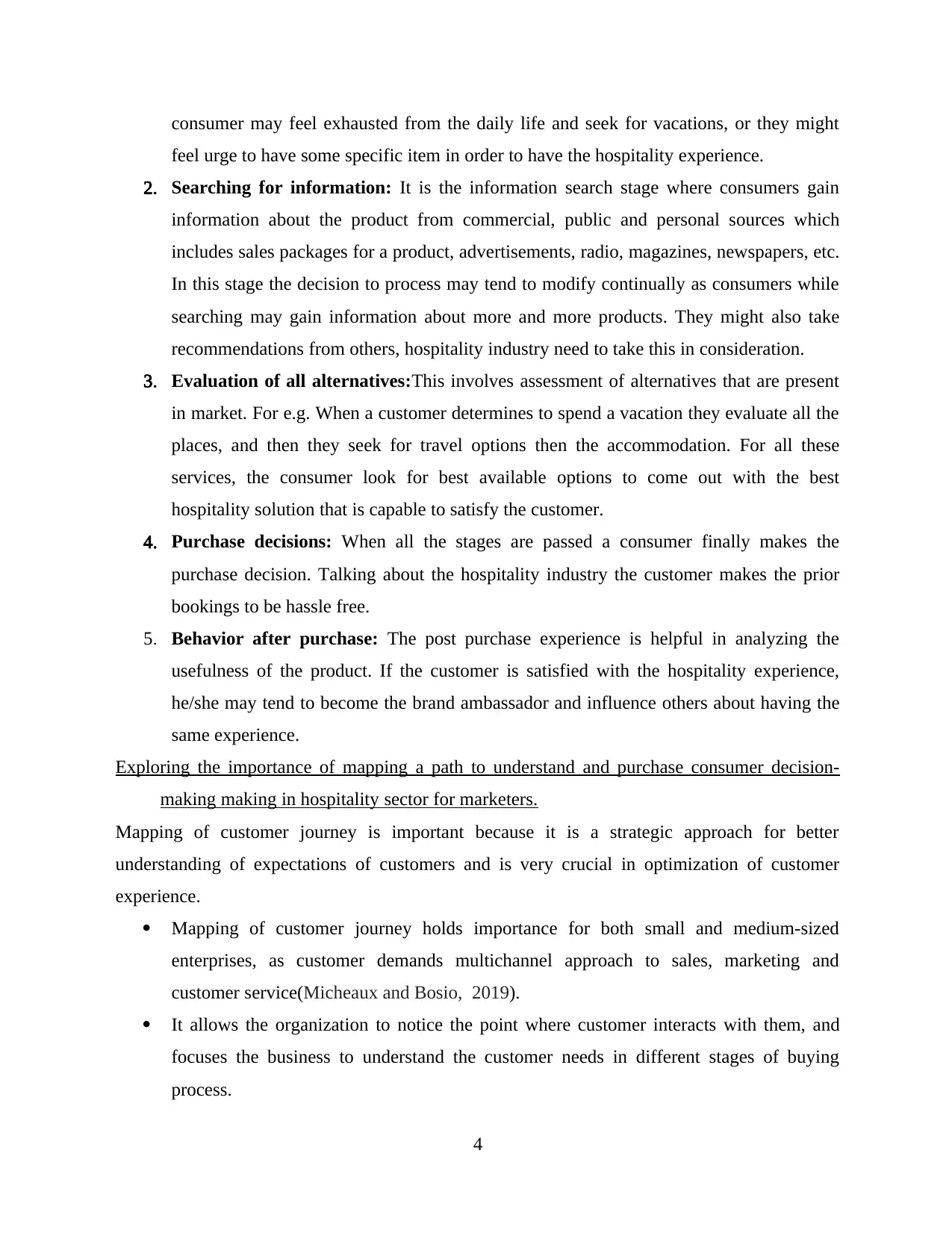
consumer may feel exhausted from the daily life and seek for vacations, or they might
feel urge to have some specific item in order to have the hospitality experience.
2. Searching for information: It is the information search stage where consumers gain
information about the product from commercial, public and personal sources which
includes sales packages for a product, advertisements, radio, magazines, newspapers, etc.
In this stage the decision to process may tend to modify continually as consumers while
searching may gain information about more and more products. They might also take
recommendations from others, hospitality industry need to take this in consideration.
3. Evaluation of all alternatives:This involves assessment of alternatives that are present
in market. For e.g. When a customer determines to spend a vacation they evaluate all the
places, and then they seek for travel options then the accommodation. For all these
services, the consumer look for best available options to come out with the best
hospitality solution that is capable to satisfy the customer.
4. Purchase decisions: When all the stages are passed a consumer finally makes the
purchase decision. Talking about the hospitality industry the customer makes the prior
bookings to be hassle free.
5. Behavior after purchase: The post purchase experience is helpful in analyzing the
usefulness of the product. If the customer is satisfied with the hospitality experience,
he/she may tend to become the brand ambassador and influence others about having the
same experience.
Exploring the importance of mapping a path to understand and purchase consumer decision-
making making in hospitality sector for marketers.
Mapping of customer journey is important because it is a strategic approach for better
understanding of expectations of customers and is very crucial in optimization of customer
experience.
Mapping of customer journey holds importance for both small and medium-sized
enterprises, as customer demands multichannel approach to sales, marketing and
customer service(Micheaux and Bosio, 2019).
It allows the organization to notice the point where customer interacts with them, and
focuses the business to understand the customer needs in different stages of buying
process.
4
feel urge to have some specific item in order to have the hospitality experience.
2. Searching for information: It is the information search stage where consumers gain
information about the product from commercial, public and personal sources which
includes sales packages for a product, advertisements, radio, magazines, newspapers, etc.
In this stage the decision to process may tend to modify continually as consumers while
searching may gain information about more and more products. They might also take
recommendations from others, hospitality industry need to take this in consideration.
3. Evaluation of all alternatives:This involves assessment of alternatives that are present
in market. For e.g. When a customer determines to spend a vacation they evaluate all the
places, and then they seek for travel options then the accommodation. For all these
services, the consumer look for best available options to come out with the best
hospitality solution that is capable to satisfy the customer.
4. Purchase decisions: When all the stages are passed a consumer finally makes the
purchase decision. Talking about the hospitality industry the customer makes the prior
bookings to be hassle free.
5. Behavior after purchase: The post purchase experience is helpful in analyzing the
usefulness of the product. If the customer is satisfied with the hospitality experience,
he/she may tend to become the brand ambassador and influence others about having the
same experience.
Exploring the importance of mapping a path to understand and purchase consumer decision-
making making in hospitality sector for marketers.
Mapping of customer journey is important because it is a strategic approach for better
understanding of expectations of customers and is very crucial in optimization of customer
experience.
Mapping of customer journey holds importance for both small and medium-sized
enterprises, as customer demands multichannel approach to sales, marketing and
customer service(Micheaux and Bosio, 2019).
It allows the organization to notice the point where customer interacts with them, and
focuses the business to understand the customer needs in different stages of buying
process.
4
⊘ This is a preview!⊘
Do you want full access?
Subscribe today to unlock all pages.

Trusted by 1+ million students worldwide
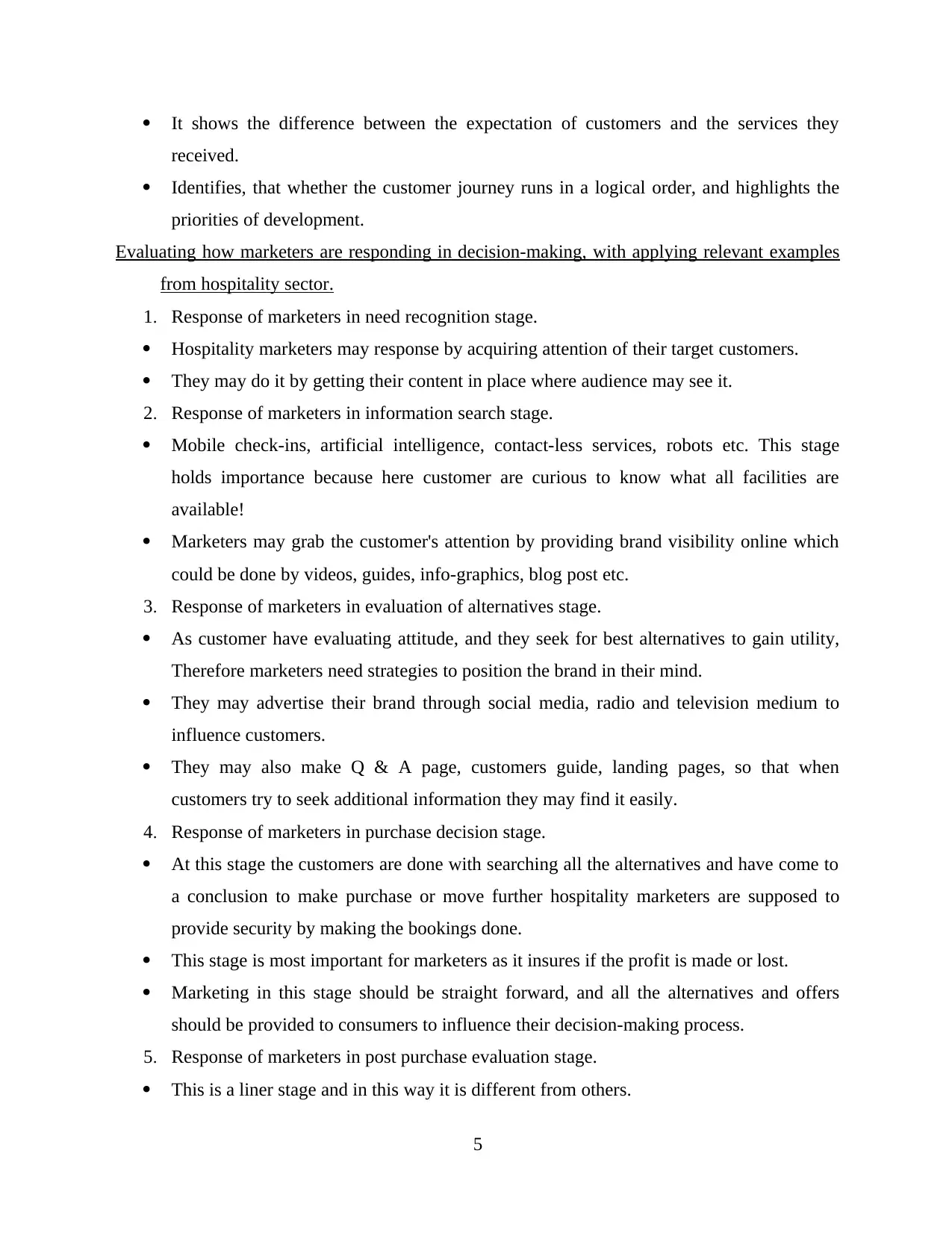
It shows the difference between the expectation of customers and the services they
received.
Identifies, that whether the customer journey runs in a logical order, and highlights the
priorities of development.
Evaluating how marketers are responding in decision-making, with applying relevant examples
from hospitality sector.
1. Response of marketers in need recognition stage.
Hospitality marketers may response by acquiring attention of their target customers.
They may do it by getting their content in place where audience may see it.
2. Response of marketers in information search stage.
Mobile check-ins, artificial intelligence, contact-less services, robots etc. This stage
holds importance because here customer are curious to know what all facilities are
available!
Marketers may grab the customer's attention by providing brand visibility online which
could be done by videos, guides, info-graphics, blog post etc.
3. Response of marketers in evaluation of alternatives stage.
As customer have evaluating attitude, and they seek for best alternatives to gain utility,
Therefore marketers need strategies to position the brand in their mind.
They may advertise their brand through social media, radio and television medium to
influence customers.
They may also make Q & A page, customers guide, landing pages, so that when
customers try to seek additional information they may find it easily.
4. Response of marketers in purchase decision stage.
At this stage the customers are done with searching all the alternatives and have come to
a conclusion to make purchase or move further hospitality marketers are supposed to
provide security by making the bookings done.
This stage is most important for marketers as it insures if the profit is made or lost.
Marketing in this stage should be straight forward, and all the alternatives and offers
should be provided to consumers to influence their decision-making process.
5. Response of marketers in post purchase evaluation stage.
This is a liner stage and in this way it is different from others.
5
received.
Identifies, that whether the customer journey runs in a logical order, and highlights the
priorities of development.
Evaluating how marketers are responding in decision-making, with applying relevant examples
from hospitality sector.
1. Response of marketers in need recognition stage.
Hospitality marketers may response by acquiring attention of their target customers.
They may do it by getting their content in place where audience may see it.
2. Response of marketers in information search stage.
Mobile check-ins, artificial intelligence, contact-less services, robots etc. This stage
holds importance because here customer are curious to know what all facilities are
available!
Marketers may grab the customer's attention by providing brand visibility online which
could be done by videos, guides, info-graphics, blog post etc.
3. Response of marketers in evaluation of alternatives stage.
As customer have evaluating attitude, and they seek for best alternatives to gain utility,
Therefore marketers need strategies to position the brand in their mind.
They may advertise their brand through social media, radio and television medium to
influence customers.
They may also make Q & A page, customers guide, landing pages, so that when
customers try to seek additional information they may find it easily.
4. Response of marketers in purchase decision stage.
At this stage the customers are done with searching all the alternatives and have come to
a conclusion to make purchase or move further hospitality marketers are supposed to
provide security by making the bookings done.
This stage is most important for marketers as it insures if the profit is made or lost.
Marketing in this stage should be straight forward, and all the alternatives and offers
should be provided to consumers to influence their decision-making process.
5. Response of marketers in post purchase evaluation stage.
This is a liner stage and in this way it is different from others.
5
Paraphrase This Document
Need a fresh take? Get an instant paraphrase of this document with our AI Paraphraser
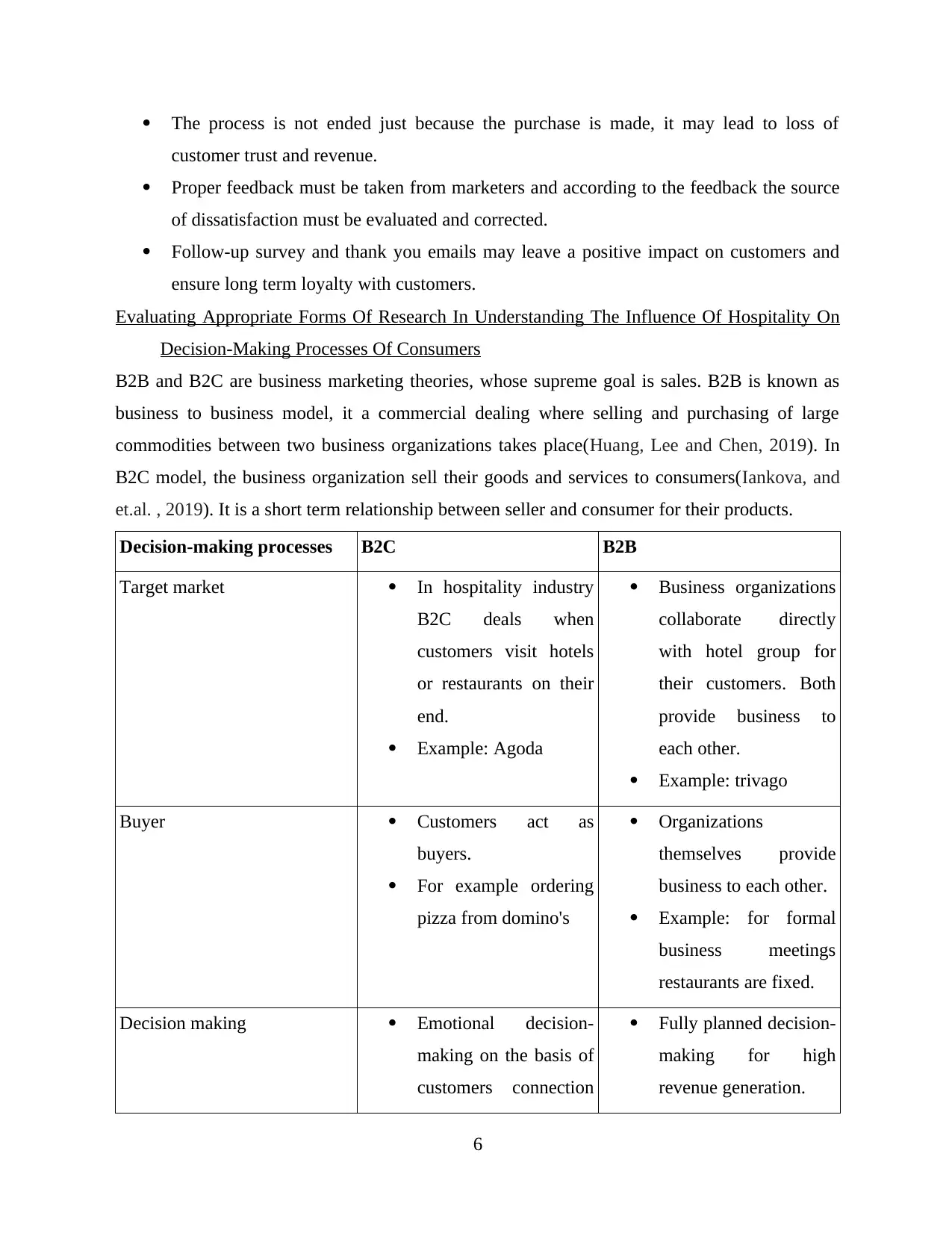
The process is not ended just because the purchase is made, it may lead to loss of
customer trust and revenue.
Proper feedback must be taken from marketers and according to the feedback the source
of dissatisfaction must be evaluated and corrected.
Follow-up survey and thank you emails may leave a positive impact on customers and
ensure long term loyalty with customers.
Evaluating Appropriate Forms Of Research In Understanding The Influence Of Hospitality On
Decision-Making Processes Of Consumers
B2B and B2C are business marketing theories, whose supreme goal is sales. B2B is known as
business to business model, it a commercial dealing where selling and purchasing of large
commodities between two business organizations takes place(Huang, Lee and Chen, 2019). In
B2C model, the business organization sell their goods and services to consumers(Iankova, and
et.al. , 2019). It is a short term relationship between seller and consumer for their products.
Decision-making processes B2C B2B
Target market In hospitality industry
B2C deals when
customers visit hotels
or restaurants on their
end.
Example: Agoda
Business organizations
collaborate directly
with hotel group for
their customers. Both
provide business to
each other.
Example: trivago
Buyer Customers act as
buyers.
For example ordering
pizza from domino's
Organizations
themselves provide
business to each other.
Example: for formal
business meetings
restaurants are fixed.
Decision making Emotional decision-
making on the basis of
customers connection
Fully planned decision-
making for high
revenue generation.
6
customer trust and revenue.
Proper feedback must be taken from marketers and according to the feedback the source
of dissatisfaction must be evaluated and corrected.
Follow-up survey and thank you emails may leave a positive impact on customers and
ensure long term loyalty with customers.
Evaluating Appropriate Forms Of Research In Understanding The Influence Of Hospitality On
Decision-Making Processes Of Consumers
B2B and B2C are business marketing theories, whose supreme goal is sales. B2B is known as
business to business model, it a commercial dealing where selling and purchasing of large
commodities between two business organizations takes place(Huang, Lee and Chen, 2019). In
B2C model, the business organization sell their goods and services to consumers(Iankova, and
et.al. , 2019). It is a short term relationship between seller and consumer for their products.
Decision-making processes B2C B2B
Target market In hospitality industry
B2C deals when
customers visit hotels
or restaurants on their
end.
Example: Agoda
Business organizations
collaborate directly
with hotel group for
their customers. Both
provide business to
each other.
Example: trivago
Buyer Customers act as
buyers.
For example ordering
pizza from domino's
Organizations
themselves provide
business to each other.
Example: for formal
business meetings
restaurants are fixed.
Decision making Emotional decision-
making on the basis of
customers connection
Fully planned decision-
making for high
revenue generation.
6
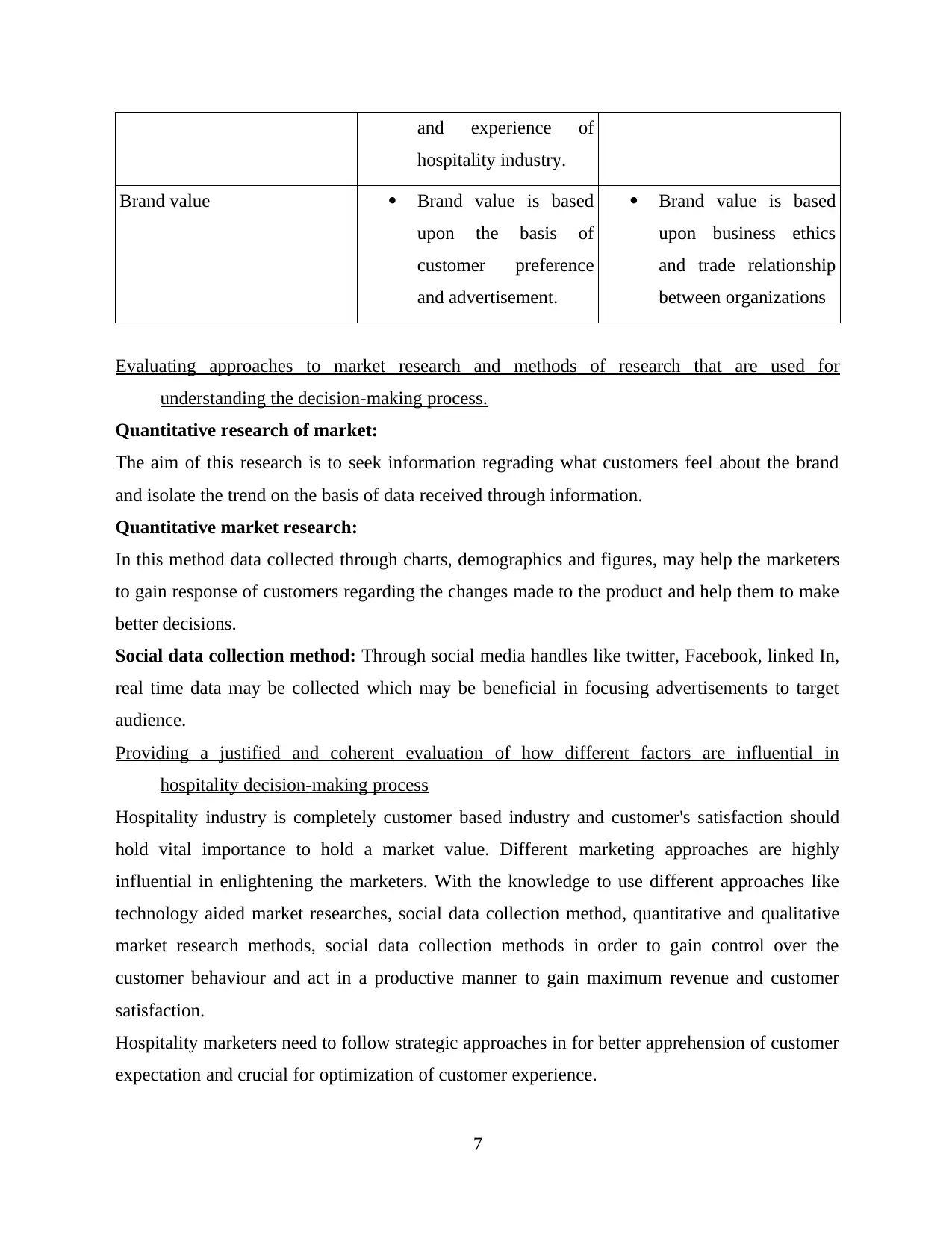
and experience of
hospitality industry.
Brand value Brand value is based
upon the basis of
customer preference
and advertisement.
Brand value is based
upon business ethics
and trade relationship
between organizations
Evaluating approaches to market research and methods of research that are used for
understanding the decision-making process.
Quantitative research of market:
The aim of this research is to seek information regrading what customers feel about the brand
and isolate the trend on the basis of data received through information.
Quantitative market research:
In this method data collected through charts, demographics and figures, may help the marketers
to gain response of customers regarding the changes made to the product and help them to make
better decisions.
Social data collection method: Through social media handles like twitter, Facebook, linked In,
real time data may be collected which may be beneficial in focusing advertisements to target
audience.
Providing a justified and coherent evaluation of how different factors are influential in
hospitality decision-making process
Hospitality industry is completely customer based industry and customer's satisfaction should
hold vital importance to hold a market value. Different marketing approaches are highly
influential in enlightening the marketers. With the knowledge to use different approaches like
technology aided market researches, social data collection method, quantitative and qualitative
market research methods, social data collection methods in order to gain control over the
customer behaviour and act in a productive manner to gain maximum revenue and customer
satisfaction.
Hospitality marketers need to follow strategic approaches in for better apprehension of customer
expectation and crucial for optimization of customer experience.
7
hospitality industry.
Brand value Brand value is based
upon the basis of
customer preference
and advertisement.
Brand value is based
upon business ethics
and trade relationship
between organizations
Evaluating approaches to market research and methods of research that are used for
understanding the decision-making process.
Quantitative research of market:
The aim of this research is to seek information regrading what customers feel about the brand
and isolate the trend on the basis of data received through information.
Quantitative market research:
In this method data collected through charts, demographics and figures, may help the marketers
to gain response of customers regarding the changes made to the product and help them to make
better decisions.
Social data collection method: Through social media handles like twitter, Facebook, linked In,
real time data may be collected which may be beneficial in focusing advertisements to target
audience.
Providing a justified and coherent evaluation of how different factors are influential in
hospitality decision-making process
Hospitality industry is completely customer based industry and customer's satisfaction should
hold vital importance to hold a market value. Different marketing approaches are highly
influential in enlightening the marketers. With the knowledge to use different approaches like
technology aided market researches, social data collection method, quantitative and qualitative
market research methods, social data collection methods in order to gain control over the
customer behaviour and act in a productive manner to gain maximum revenue and customer
satisfaction.
Hospitality marketers need to follow strategic approaches in for better apprehension of customer
expectation and crucial for optimization of customer experience.
7
⊘ This is a preview!⊘
Do you want full access?
Subscribe today to unlock all pages.

Trusted by 1+ million students worldwide
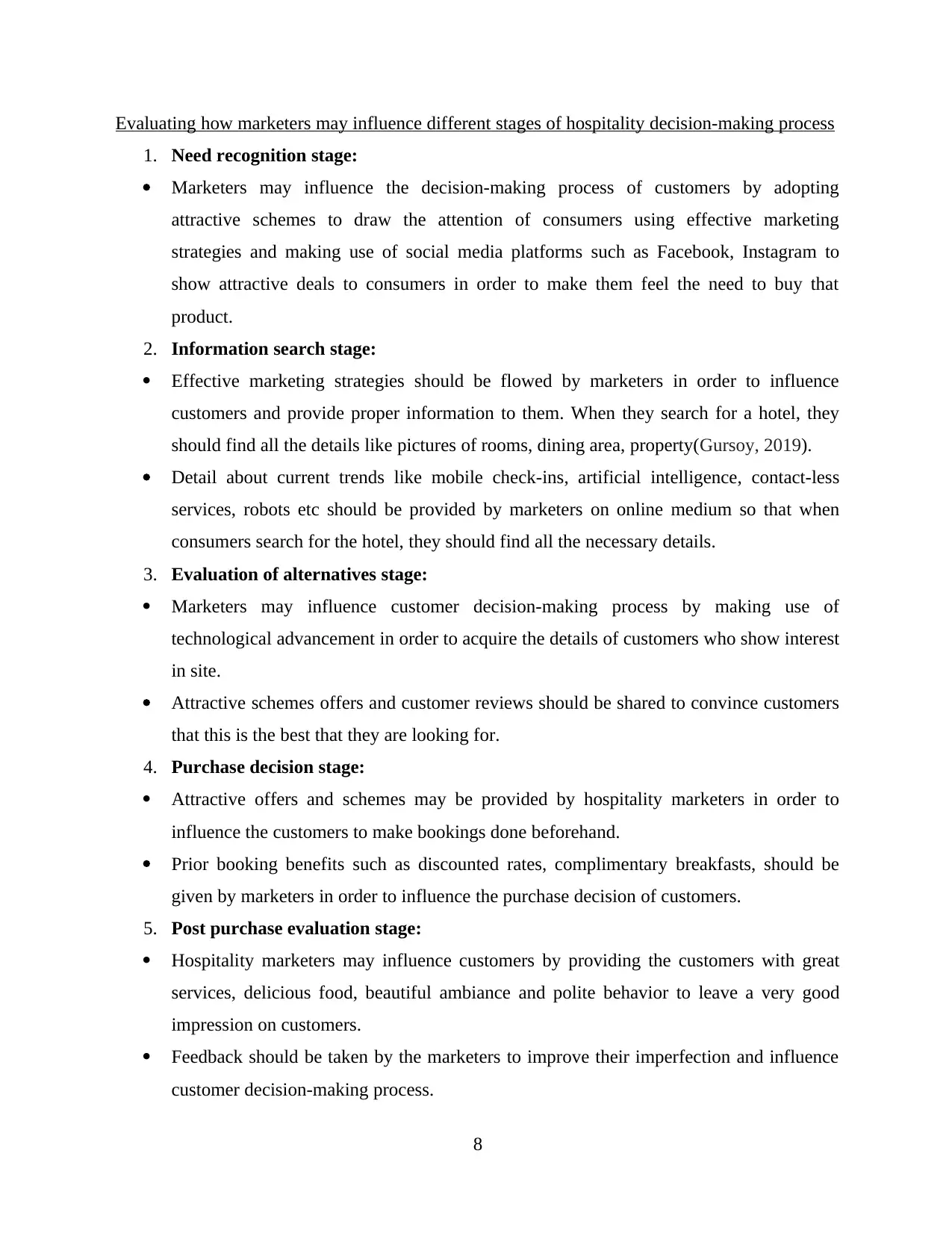
Evaluating how marketers may influence different stages of hospitality decision-making process
1. Need recognition stage:
Marketers may influence the decision-making process of customers by adopting
attractive schemes to draw the attention of consumers using effective marketing
strategies and making use of social media platforms such as Facebook, Instagram to
show attractive deals to consumers in order to make them feel the need to buy that
product.
2. Information search stage:
Effective marketing strategies should be flowed by marketers in order to influence
customers and provide proper information to them. When they search for a hotel, they
should find all the details like pictures of rooms, dining area, property(Gursoy, 2019).
Detail about current trends like mobile check-ins, artificial intelligence, contact-less
services, robots etc should be provided by marketers on online medium so that when
consumers search for the hotel, they should find all the necessary details.
3. Evaluation of alternatives stage:
Marketers may influence customer decision-making process by making use of
technological advancement in order to acquire the details of customers who show interest
in site.
Attractive schemes offers and customer reviews should be shared to convince customers
that this is the best that they are looking for.
4. Purchase decision stage:
Attractive offers and schemes may be provided by hospitality marketers in order to
influence the customers to make bookings done beforehand.
Prior booking benefits such as discounted rates, complimentary breakfasts, should be
given by marketers in order to influence the purchase decision of customers.
5. Post purchase evaluation stage:
Hospitality marketers may influence customers by providing the customers with great
services, delicious food, beautiful ambiance and polite behavior to leave a very good
impression on customers.
Feedback should be taken by the marketers to improve their imperfection and influence
customer decision-making process.
8
1. Need recognition stage:
Marketers may influence the decision-making process of customers by adopting
attractive schemes to draw the attention of consumers using effective marketing
strategies and making use of social media platforms such as Facebook, Instagram to
show attractive deals to consumers in order to make them feel the need to buy that
product.
2. Information search stage:
Effective marketing strategies should be flowed by marketers in order to influence
customers and provide proper information to them. When they search for a hotel, they
should find all the details like pictures of rooms, dining area, property(Gursoy, 2019).
Detail about current trends like mobile check-ins, artificial intelligence, contact-less
services, robots etc should be provided by marketers on online medium so that when
consumers search for the hotel, they should find all the necessary details.
3. Evaluation of alternatives stage:
Marketers may influence customer decision-making process by making use of
technological advancement in order to acquire the details of customers who show interest
in site.
Attractive schemes offers and customer reviews should be shared to convince customers
that this is the best that they are looking for.
4. Purchase decision stage:
Attractive offers and schemes may be provided by hospitality marketers in order to
influence the customers to make bookings done beforehand.
Prior booking benefits such as discounted rates, complimentary breakfasts, should be
given by marketers in order to influence the purchase decision of customers.
5. Post purchase evaluation stage:
Hospitality marketers may influence customers by providing the customers with great
services, delicious food, beautiful ambiance and polite behavior to leave a very good
impression on customers.
Feedback should be taken by the marketers to improve their imperfection and influence
customer decision-making process.
8
Paraphrase This Document
Need a fresh take? Get an instant paraphrase of this document with our AI Paraphraser
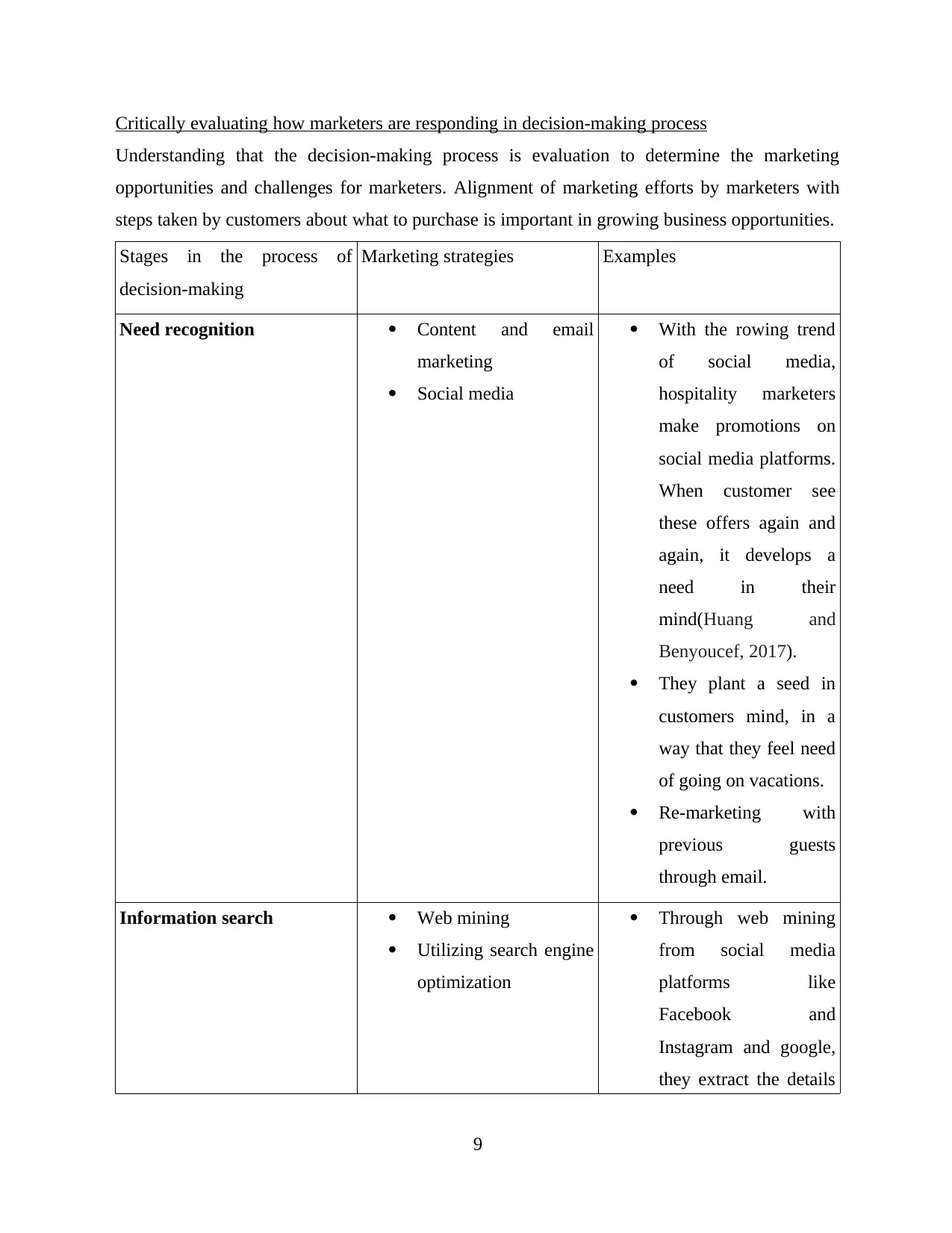
Critically evaluating how marketers are responding in decision-making process
Understanding that the decision-making process is evaluation to determine the marketing
opportunities and challenges for marketers. Alignment of marketing efforts by marketers with
steps taken by customers about what to purchase is important in growing business opportunities.
Stages in the process of
decision-making
Marketing strategies Examples
Need recognition Content and email
marketing
Social media
With the rowing trend
of social media,
hospitality marketers
make promotions on
social media platforms.
When customer see
these offers again and
again, it develops a
need in their
mind(Huang and
Benyoucef, 2017).
They plant a seed in
customers mind, in a
way that they feel need
of going on vacations.
Re-marketing with
previous guests
through email.
Information search Web mining
Utilizing search engine
optimization
Through web mining
from social media
platforms like
Facebook and
Instagram and google,
they extract the details
9
Understanding that the decision-making process is evaluation to determine the marketing
opportunities and challenges for marketers. Alignment of marketing efforts by marketers with
steps taken by customers about what to purchase is important in growing business opportunities.
Stages in the process of
decision-making
Marketing strategies Examples
Need recognition Content and email
marketing
Social media
With the rowing trend
of social media,
hospitality marketers
make promotions on
social media platforms.
When customer see
these offers again and
again, it develops a
need in their
mind(Huang and
Benyoucef, 2017).
They plant a seed in
customers mind, in a
way that they feel need
of going on vacations.
Re-marketing with
previous guests
through email.
Information search Web mining
Utilizing search engine
optimization
Through web mining
from social media
platforms like
Facebook and
Instagram and google,
they extract the details
9
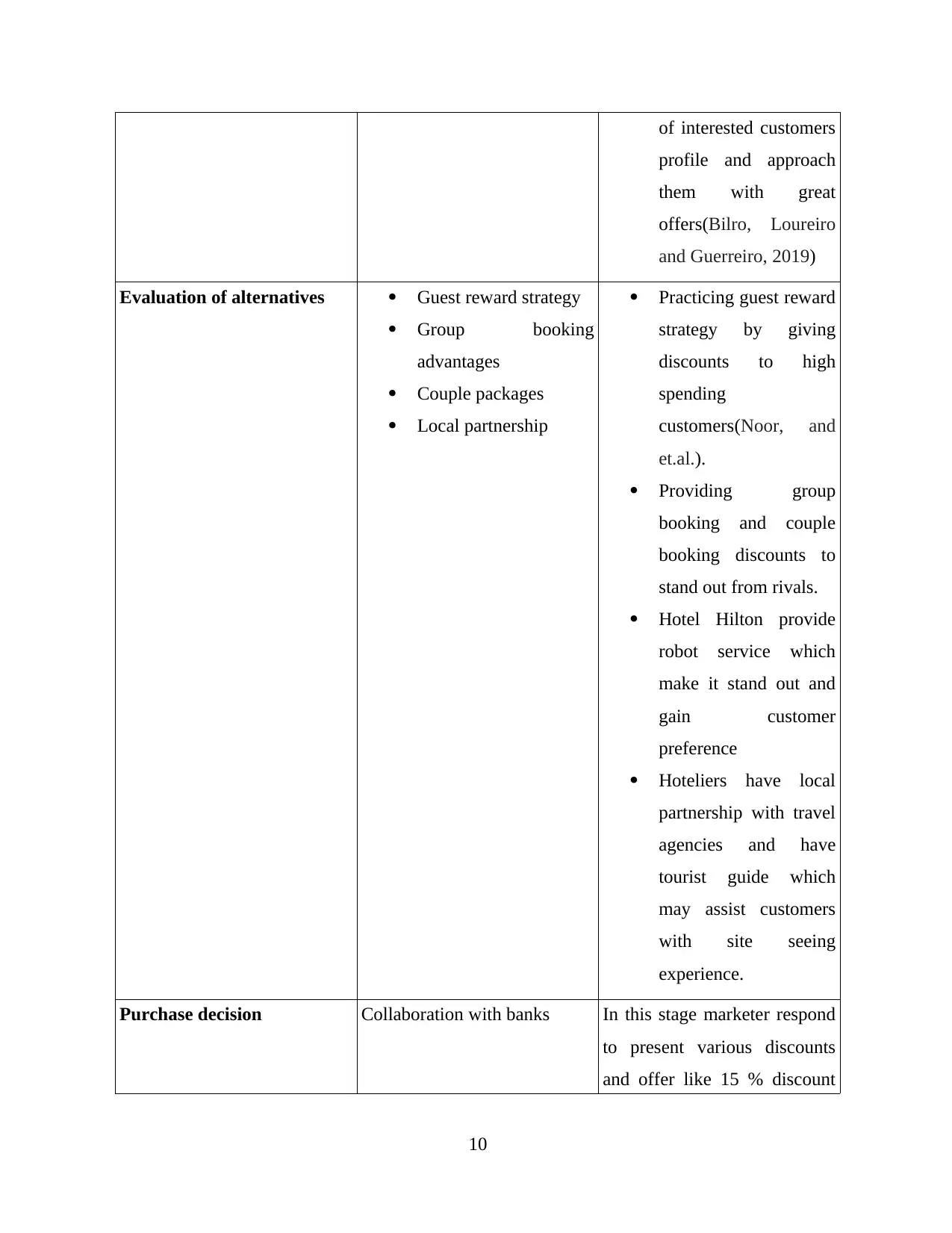
of interested customers
profile and approach
them with great
offers(Bilro, Loureiro
and Guerreiro, 2019)
Evaluation of alternatives Guest reward strategy
Group booking
advantages
Couple packages
Local partnership
Practicing guest reward
strategy by giving
discounts to high
spending
customers(Noor, and
et.al.).
Providing group
booking and couple
booking discounts to
stand out from rivals.
Hotel Hilton provide
robot service which
make it stand out and
gain customer
preference
Hoteliers have local
partnership with travel
agencies and have
tourist guide which
may assist customers
with site seeing
experience.
Purchase decision Collaboration with banks In this stage marketer respond
to present various discounts
and offer like 15 % discount
10
profile and approach
them with great
offers(Bilro, Loureiro
and Guerreiro, 2019)
Evaluation of alternatives Guest reward strategy
Group booking
advantages
Couple packages
Local partnership
Practicing guest reward
strategy by giving
discounts to high
spending
customers(Noor, and
et.al.).
Providing group
booking and couple
booking discounts to
stand out from rivals.
Hotel Hilton provide
robot service which
make it stand out and
gain customer
preference
Hoteliers have local
partnership with travel
agencies and have
tourist guide which
may assist customers
with site seeing
experience.
Purchase decision Collaboration with banks In this stage marketer respond
to present various discounts
and offer like 15 % discount
10
⊘ This is a preview!⊘
Do you want full access?
Subscribe today to unlock all pages.

Trusted by 1+ million students worldwide
1 out of 14
Related Documents
Your All-in-One AI-Powered Toolkit for Academic Success.
+13062052269
info@desklib.com
Available 24*7 on WhatsApp / Email
![[object Object]](/_next/static/media/star-bottom.7253800d.svg)
Unlock your academic potential
Copyright © 2020–2026 A2Z Services. All Rights Reserved. Developed and managed by ZUCOL.
